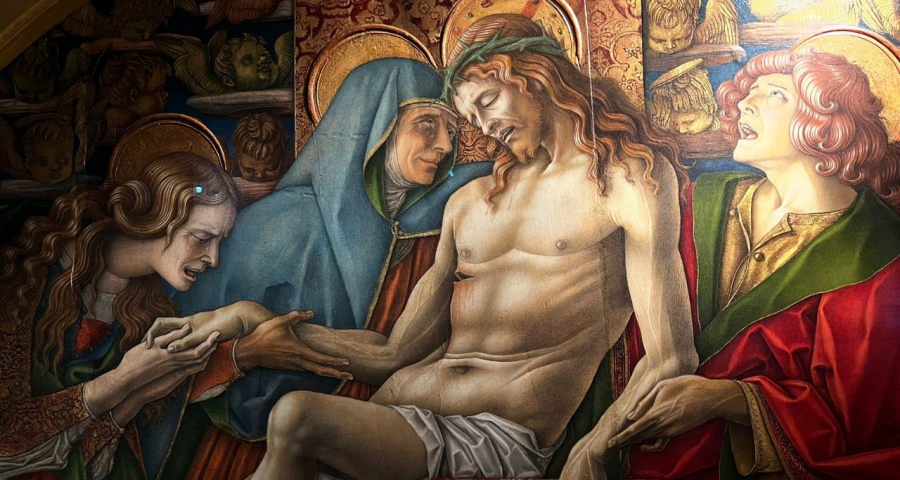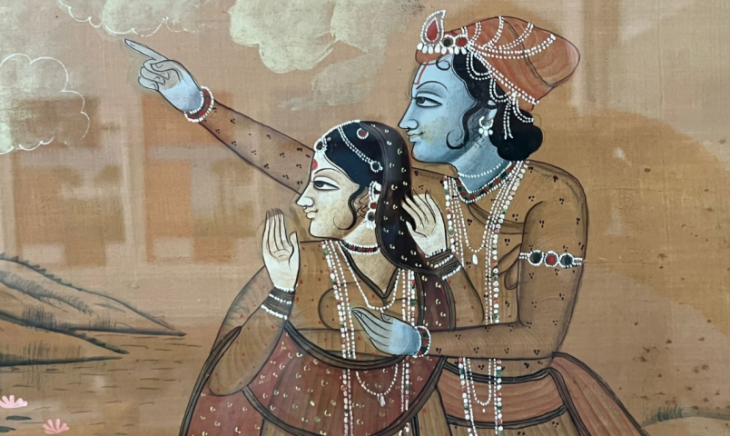The Star of absence/10 - We are all protagonists of the book of God, who reads it, is moved by it and loves us.
By Luigino Bruni
Published in Avvenire 05/02/2023
"Those circles, that seemed to be conceived in you as reflected light, when traversed by my eyes, a little, seemed to be adorned inside themselves, with our image, in its proper colours, and, to that, my sight was wholly committed"
Dante Alighieri, Paradiso XXXIII, 127-132
The sad way in which cruel Haman meets his end and Esther’s victory offer us the opportunity to understand new aspects of biblical humanism and the ethical role of our reading.
Re-reading our most beloved books from time to time is an excellent exercise in understanding the moral development of our soul. Years later, we may realize that we feel different emotions from those we felt in the past when faced with the same pages. We meet characters we used to hate and that disdain has made us better, and suddenly we find ourselves inside a new strange feeling of compassion, and an unknown piety flourishes. Life and pain have tamed us and taught us that, hidden underneath sins and wickedness there is a radical kind of innocence kept in the heart of every person on earth. And we finally see it, recognize it, and tune in with it while it moves us.
Great literature is essential thanks to these improbable exercises in empathy as well. Biblical reading, furthermore, allows us to carry out this exercise while reading a single book. There is no need to spend years doing it; it is quite possible for this new pietas to mature chapter after chapter in a matter of days. Without really wanting to or being aware of it, we are moved by Cain the fratricide, by the repudiated Saul, by the brothers who sell Joseph, by the rich young man who does not pass through the eye of the needle, by the Levite and the priest who see but continue on their way. Hence, a deep and invincible desire, that no one should be deprived of the dignity of recognizing his own face "adorned with our image" in the heart of God, is suddenly born within us.
«When Haman told his wife Zeresh and all his friends everything that had happened to him, his wise men and his wife Zeresh said to him, “If Mordecai, before whom you have begun to fall, is of Jewish descent, you will not prevail against him but will surely fall before him”» (Esther 6,13). After the fortunes (purim) of Mordecai and Prime Minister Haman began to reverse, Haman returned home, and there he heard his wife speak words of truth that he had never wanted to hear. Zeresh had entered the scene in chapter 5, with a different role, when her husband was at the peak of his success and was preparing for the banquet with Esther and the king – here their roles and fortune are reversed, as well: « Nevertheless Haman restrained himself and went home, and he sent and called for his friends and his wife Zeresh… “Let a gallows be made, fifty cubits high, and in the morning suggest to the king that Mordecai be hanged on it; then go merrily with the king to the banquet.” And the thing pleased Haman; so he had the gallows made» (Esther 5,10-14). A bad ancient of the Persian-Iranian leaders to have the victims hanged on tall poles (about 25 meters), wooden poles or iron cranes. In a biblical universe inhabited by female stars who leave brilliant trails of sapiential light, every now and then a woman appears to play a dark part. Zeresh is a companion of Jezebel and Athaliah, women and wives who wove plans of death and pronounced words of curses. Human history is also made up of decisions made by powerful men, born in the intimate dialogue in their home with a woman; these different and good words, often, almost always, humanized (and humanize) them and their power, but they rarely enraged and made them worse. The Bible is not ideological also due to this continuous reversal of roles and "destiny", which does not block social categories or genders or people in the perfect traps of "always" and "never".
«While they were still talking with him, the king’s eunuchs came, and hastened to bring Haman to the banquet which Esther had prepared» (Esther 6,14). After two consecutive postponements, here we finally find ourselves at the dramatic centre of the book of Esther: «The king again asked, “Queen Esther, what is your petition? It will be given you. What is your request? Even up to half the kingdom, it will be granted”» (Esther 7,1-2). Thus we are back to that "half of the kingdom" that reminds readers of the New Testament of Herodias - the Bible must be read as a whole, sometimes the light of a character in a book serves to compensate for the darkness of another, thus reducing the global ethical and spiritual impact. Here is the request we have been waiting for so long: «Then Queen Esther answered, “If I have found favor with you, Your Majesty, and if it pleases you, grant me my life - this is my petition. And spare my people - this is my request» (Esther 7,3). King Xerxes asked Queen Esther, «Who is he? Where is he—the man who has dared to do such a thing?» (Esther 7,5-6).
In certain decisive circumstances, human beings come to know an infinite and different kind of force, women especially do so differently and more intensely. We have seen this many times in the Bible: in Naomi who teaches Ruth how to conquer Boaz in order to have a future, in the Shunammite woman who does not believe in the death of her child and "steals" the resurrection of his son from the prophet Elisha, in the women who manage to stay under the cross while all the males flee in fear. Perhaps, in those few decisive moments, only they possess the grammar of time, especially when the life and death of those they love is at stake. In these situations, they perfectly guess the right rhythm of their actions and the right choice of words. They are masters of logos and decisive encounters and they know how to spend hours on end entirely immersed and lost in dialogues just for the sake of conversation. They know how to keep silent for days, years even; but when that precise moment arrives, they find a strength that appears unlimited to us, and they are no longer intimidated by the powerful, by kings, or by God. This is a demonstration of it, among the most effective and beautiful present in the whole Bible: «Esther said, “An adversary and enemy! This vile Haman!”» (Esther 7,6). Ester feels that her entire destiny is concentrated in that answer, in that one single point in time, that she has reached the centre of her marvellous tale of the exiled girl who became queen: and she perceives that that tale was part of a much greater mystery.
And in that sentence pronounced by Esther, we perceive the same sort of strength of some words pronounced by our wives, mothers, sisters, daughters who, in a crucial moment of their lives, found a strength that was hidden, above all from themselves, and proceeded to pronounce only the right words - "enough", "it's over", "leave", "yes", "no", "shame on you". In the dress rehearsal performed alone in front of the mirror, they had never managed to say that terrible sentence with such perfection; but once they found themselves in the midst of the drama, they made it, sometimes, just that one time. They also managed to speak in front of the great, the powerful, the ruthless and evil Prime Minister Haman, thanks to that unique strength, that life occasionally associates with this type of fragility that opens the sky and that women only share with the poor and the angels. Sometimes the cyclopean effort of these moments generates a long-lasting sort of tiredness, sometimes too long and painful; but those words of birth save both them and everyone else. An aspect of the special kind of pain that accompanies their life from an early age lies in this special relationship of women with the word, with words and with relationships. However, this is also the secret of their ability to listen to the voices of the angels and of God and to guard the faith – when the Lord returns, if he still finds faith on earth, it will be a woman who has saved it, perhaps without realizing it while following the trail of an instinct of life.
These words, therefore, have a special performative capacity: one cannot retort anything back; they cannot be countered, because they possess the nature of flesh-words, imposing themselves, so that we find ourselves in front of them as in front of a child. Thus, neither the king nor Haman say anything: «Then Haman was terrified before the king and queen. The king got up in a rage, left his wine and went out into the palace garden» (Esther 7,6-7). Haman understands that the tides have definitely turned. The king goes out to get some fresh air, once again in a rage, hoping to ease his nerves a little. Meanwhile, a terrified Haman tries his last resort: he throws himself at Esther's feet and begs her to save him. A further misunderstanding ends up perfecting Haman's condemnation: «Just as the king returned from the palace garden to the banquet hall, Haman was falling on the couch where Esther was reclining. The king exclaimed, “Will he even molest the queen while she is with me in the house?”» (Esther 7,8).
And here, faced with Haman begging for mercy, we readers enter the scene. We have followed Haman in his murderous intent. We have criticized him, despised him, feeling indignant, and due to that intentional ignorance necessary when one reads and re-reads a biblical book (or a very great book), we did not want to know the outcome of his plan of extermination. We just wished, prayed, that Mordecai and Esther would be able to stop his killing hand. Now, however, as our prayer-wish is finally being answered and we see him fall at Esther's feet, something changes, something can change, because here the Bible asks us to make an ethical choice of our own. We can continue to rejoice in the face of Haman who has become weak and defeated, we can rejoice in the reversed fortunes and justice being done, and we leave the book as we entered it. Nevertheless, we can also decide not to enjoy reading about how Haman meets his end: «Then Harbona, one of the eunuchs attending the king, said, “A pole reaching to a height of fifty cubits stands by Haman’s house. He had it set up for Mordecai…” The king said, “Impale him on it!” So they impaled Haman on the pole he had set up for Mordecai. Then the king’s fury subsided» (Esther 7,9-10).
Once again, we are able to find a strange, good and unexpected form of pietas within our soul, which does not let us enjoy the ruin of others even when they are terrible and thoroughly bad, even when their end was already written in the script. We have the freedom to change our own scripts and therefore we also have a moral responsibility to change those of others in our souls as well. Hence, when we are able to feel this compassion, (not necessary, only possible), we are also suddenly able to see that we are the characters in God's book, saved and loved even when we play the cursed part. And if there was someone in the whole universe capable of observing God as he reads about us, they would see him moved as he re-read our dark stories, and after each re-reading he would proceed to love us even more.
Every day, the Bible waits for us to write pages that have not yet been written with the pen of the soul: those that speak of the older brother who accompanies his father to welcome the prodigal son and then prepares the banquet. Those that speak of the two thieves who arrive together in paradise, and of Judas who, while hearing the word "friend" spoken only for him, weeps and then cries out: "My Lord and my God".













